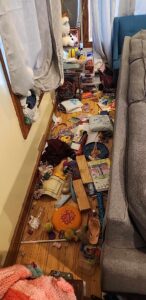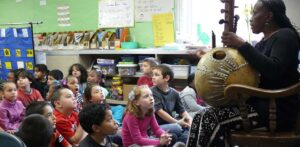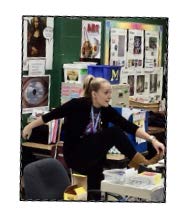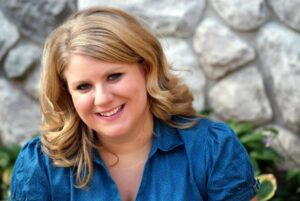I work a full-time job. I have two side gigs teaching. I have a six-and-a-half-year-old daughter and a very furry dog. All of this is to say that my house is rarely sparkling clean. In addition, the past few months have been extremely busy, with some added family commitments, and travel. So, when my husband told me he couldn’t find our spare key fob I wasn’t surprised. He informed me that he intended to pull the couch away from the wall to search and I agreed that was a good idea. I expected that there would be a few socks, probably a granola bar wrapper, some Barbie clothes, and plenty of dog hair dust bunnies. I was in no way prepared for the photo that my husband sent me. Please allow me to be extremely vulnerable and share this:
 What?!?! Do we have a Hobbit living under that couch? Are those two-by-fours? And an unopened Amazon package? The chaos that existed under that couch was more than I ever could have ever imagined. Yet, our quest to find the key fob brought some unexpected inspiration. To clean up any particularly messy area, there are several important skills and approaches that make the task doable, like taking dedicated time, sorting through things, recruiting others to help and flexibility. My overall motto, strange as it may sound, is: To really clean a room, sometimes you need to make a bigger mess first. While thinking through this process of prioritizing and reorganizing , I was taken aback at how this parallels my work life right now.
What?!?! Do we have a Hobbit living under that couch? Are those two-by-fours? And an unopened Amazon package? The chaos that existed under that couch was more than I ever could have ever imagined. Yet, our quest to find the key fob brought some unexpected inspiration. To clean up any particularly messy area, there are several important skills and approaches that make the task doable, like taking dedicated time, sorting through things, recruiting others to help and flexibility. My overall motto, strange as it may sound, is: To really clean a room, sometimes you need to make a bigger mess first. While thinking through this process of prioritizing and reorganizing , I was taken aback at how this parallels my work life right now.
Currently, I manage the education programs for the Wharton Center for the Performing Arts. In December 2023, my former boss retired after sixteen years with our organization. He was the first to have his position as Director of the Institute for Arts & Creativity. He took a department that had about three programs to its name and, with his team, grew it to over 14 programs, serving 20,000 learners every year. Before the COVID-19 pandemic and resulting shutdown in 2020, the Institute was growing at a pace that was almost impossible to keep up with. Programs were expanding across the state, taking in more participants than ever, and filling the spaces within Wharton Center week after week. We were an exhausting success!
As we began to open back up in 2021, Wharton Center was transitioning to a new Executive Director and then came the announcement of my boss’s retirement. I am now taking the leadership position in my department, and we are facing all of the realities and sometimes  discomfort of a major internal transition. With this shift has also come an opportunity to make an evaluative “mess” and then “clean it up”. To achieve this, we have decided to take the next few months to slow down and fully evaluate the programs we currently have: Do they serve our mission? Is the investment of time and funding appropriate for the outcome and impact? Do we have the staff we need to effectively carry out the programs we currently offer? Are there new ideas on the horizon that we want to explore? While I certainly wouldn’t categorize the state of our department as “messy,” we had accumulated sixteen years’ worth of viewpoints, best practices, and methods and now, with the transition, we are making time to evaluate our educational position within the organization and the community.
discomfort of a major internal transition. With this shift has also come an opportunity to make an evaluative “mess” and then “clean it up”. To achieve this, we have decided to take the next few months to slow down and fully evaluate the programs we currently have: Do they serve our mission? Is the investment of time and funding appropriate for the outcome and impact? Do we have the staff we need to effectively carry out the programs we currently offer? Are there new ideas on the horizon that we want to explore? While I certainly wouldn’t categorize the state of our department as “messy,” we had accumulated sixteen years’ worth of viewpoints, best practices, and methods and now, with the transition, we are making time to evaluate our educational position within the organization and the community.
So what are the skills and approaches needed to reorganize and prioritize? The first step in cleaning a mess is to slow down and make sure you have adequate time to accomplish the task at hand. In order to find the spare keys, we needed to stop our busy schedules and really take a look at the places that are easily bypassed out of habit. We looked in coat pockets, in purses and bags, and in the meantime just drove our other vehicle out of convenience. We had to take the time to retrace steps and consider where the keys could be. At Wharton Center, to fully evaluate our educational programming, we need to do the same. It feels like a luxury to have this time to dig into our processes and evaluate the choices we’re making. There are still multiple programs running, and more ideas and growth are on the horizon. The evaluative process is not always an easy task, but it is so incredibly important. We’re learning more about the way we function both within our larger organization and as one department. This will allow us to fine-tune our offerings so that we can have the strongest impact and reach the most learners.
The next step is to start sorting things out. Placing items into piles, determining what still has a purpose, what can be given away, and what has run its course and can be let go. I feel like the biggest mess occurs at this point. It can be so easy to buy extra storage bins, come up with creative organization systems, and make the room look tidy, but to truly get things in order, you need to dig in. In our education department, there are plenty of successful programs. We could  copy and paste them year after year without much trouble, however, this robotic approach wouldn’t allow us to effectively measure the value and impact of the work, or the return on investment of staff time. Making our current programs look tidy is not an effective way to evaluate success. And sometimes, it’s simply time to say goodbye to a program that isn’t serving the mission of impacting learners in the way it used to.
copy and paste them year after year without much trouble, however, this robotic approach wouldn’t allow us to effectively measure the value and impact of the work, or the return on investment of staff time. Making our current programs look tidy is not an effective way to evaluate success. And sometimes, it’s simply time to say goodbye to a program that isn’t serving the mission of impacting learners in the way it used to.
Having a second opinion can also be a very helpful approach. I recently read a book titled How to Keep House While Drowning by KC Davis and it suggested that if you have difficulties staying on task while trying to do a large cleaning project, asking a friend to come serve as a second opinion can make the task less cumbersome. Whether this is someone to actually come and help you clean the mess, or to keep you company while you do the work, having a companion there to sort through all the details can make the process easier. At Wharton Center, we are very fortunate to have a host of creative partners to call on . Both on campus and in the community, these partners offer perspective and insight, and sometimes simple companionship as we sort through years of educational programs.
One last skill that is imperative to cleaning and reorganizing both a home and an education department is flexibility. How often have you started to throw away a rarely used item only to suddenly think of a creative way to reuse it? Or on the flip side, look at an item that seemed important and integral to your life, only to realize that it is not necessary at all. The flexibility and willingness to look at items or programs in a new way, or to change your mind, is crucial to the reorganizing process.
 Remember my motto: Sometimes when cleaning up, you have to start by making a mess. This approach allows you to uncover and discover things that have been missing. This works whether searching under the couch or analyzing programming. It is now two months into my leading the department, I am finding so many interesting tidbits of information and new ways to approach our slate of programs. I have had the opportunity to collaborate with brilliant arts makers who spend time with me scheming and dreaming about the future, as well as providing clear feedback and constructive criticism when necessary. Similarly, when the area behind the couch was successfully being cleaned up, some things were thrown away and some were put back where they belonged. And the unopened Amazon package? It was a blazer I had ordered last year, and thought was lost. Luckily, it fits and I’m excited to keep it! And if you’re wondering, we DID find the missing key fob; but in the back seat of our other vehicle. Go figure.
Remember my motto: Sometimes when cleaning up, you have to start by making a mess. This approach allows you to uncover and discover things that have been missing. This works whether searching under the couch or analyzing programming. It is now two months into my leading the department, I am finding so many interesting tidbits of information and new ways to approach our slate of programs. I have had the opportunity to collaborate with brilliant arts makers who spend time with me scheming and dreaming about the future, as well as providing clear feedback and constructive criticism when necessary. Similarly, when the area behind the couch was successfully being cleaned up, some things were thrown away and some were put back where they belonged. And the unopened Amazon package? It was a blazer I had ordered last year, and thought was lost. Luckily, it fits and I’m excited to keep it! And if you’re wondering, we DID find the missing key fob; but in the back seat of our other vehicle. Go figure.
Editor’s Note: Kelly’s personal experience in evaluating educational programming in the arts aligns well with MAEIA’s Program Review Tool. When assessing your own arts programming do you think about these questions: What does an exemplary program look like? What tool would help my district evaluate its program? What research supports the criteria for a quality arts program? Here are some resources to support your work: Michigan Blueprint of a Quality Arts Program. Program Review. Research and Recommendations Compendium. So, when you are in the midst of a messy reorganization, look to MAEIA as your helpful companion in the process.
_____________________________________________________________________________________________________________
 Kelly Stuible-Clark is the Senior Education Program Manager for Wharton Center’s Institute for Arts and Creativity. Recently completing her graduate certificate in Arts and Cultural Management and Museum Studies from Michigan State University, Kelly also holds an Master of Music in Opera and Musical Theatre Performance from Southern Illinois University, Carbondale and a Bachelor of Science in Music (Voice) from Central Michigan University. Kelly has been involved in community arts as a participant, educator, and advocate in the Lansing area for nearly twenty years, and is adjunct faculty at Lansing Community College in the Music department.
Kelly Stuible-Clark is the Senior Education Program Manager for Wharton Center’s Institute for Arts and Creativity. Recently completing her graduate certificate in Arts and Cultural Management and Museum Studies from Michigan State University, Kelly also holds an Master of Music in Opera and Musical Theatre Performance from Southern Illinois University, Carbondale and a Bachelor of Science in Music (Voice) from Central Michigan University. Kelly has been involved in community arts as a participant, educator, and advocate in the Lansing area for nearly twenty years, and is adjunct faculty at Lansing Community College in the Music department.
Photos provided by Wharton Center Education Department.
 Click here for a Printer friendly version of this article.
Click here for a Printer friendly version of this article.

Leave a Reply
You must be logged in to post a comment. Don't have an account? Register Here.